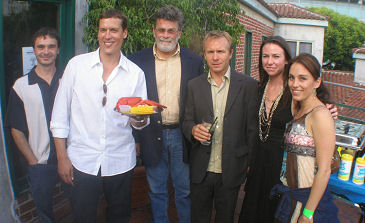“Jesus of Nazareth spent 40 days in the desert. By comparison, Superman of Hollywood languished almost 20 years in development hell. Those years apparently raised the bar fearsomely high. Last seen larking about on the big screen in the 1987 dud Superman IV, the Man of Steel has been resurrected in a leaden new film not only to fight for truth, justice and the American way, but also to give Mel Gibson’s passion a run for his box-office money. Where once the superhero flew up, up and away, he now flies down, down, down, sent from above to save mankind from its sins and what looked like another bummer summer.” — N.Y. Times critic Manohla Dargis on Superman Returns. Websters.com defines “leaden” as (1) heavy and inert, (2) listless; sluggish, 3), lacking liveliness or sparkle; dull, (4) downcast; depressed: leaden spirits. Movies are all about the eye and soul of the beholder, but trust me, leaden this film is not.
wired
What Moviegoers Want
“If a movie is good, consumers will go see it. Otherwise, they’ll choose to save gas and money and stay home and watch video-on-demand, cable or satellite, or a DVD. Or maybe they’ll just play a video game or listen to Ipods because most new movies suck big-time.” — a Nikki Finke summary in today’s Deadline Hollywood Daily of Nielsen Analytics’ and The Movie Advisory Board’s 100-page “Modern Movie Experience” study, described as “a report on moviegoer behavior today, possibilities for tomorrow, and the impact of digital technologies on the movie-value chain.”
“King of California”
A guy sent me a script this afternoon of Michael Cahill ‘s The King of California, a Michael Douglas-Evan Rachel Wood movie that Michael London and Alexander Payne are producing along with about ten others. The IMDB says it’s about “an unstable dad (Douglas) who after getting out of a mental institution tries to convince his daughter (Wood) that there’s Spanish gold buried somewhere under suburbia.” Under a Costco store, actually.

Michael Douglas
The guy who e-mailed it to me reads scripts all the time and claims “it’s one of the best I’ve have read in a while.” On top of the basic plot, which reminds me for some reason of Kurosawa’s Dodeska Den, it’s “a story about the history of California and the commercialism of the U.S…very quirky and sweet-natured with a lot to say. If the movie comes out as good as the script look for Douglas to get nominated for an Academy Award. He hasn’t had a role this great in years.” He says the film doesn’t have distribution because London and Payne didn’t want any interference from anyone while it was being shot. King wrapped a few weeks ago, and London-Payne, according to this guy, “are said to be so impressed with the assemblage that they might start start up with screenings for distributors as soon as possible so it might come out this year. If not, I assume it would go to Sundance.” I’ll read it tonight or tomorrow and render a verdict. I called London twice today and no callback yet. Has anyone else heard anything? Cahill has zip IMDB credits besides this one thing.
Wilder’s Tips
Four Billy Wilder Screenwriting Tips: (a) The more subtle and elegant you are in hiding your plot points, the better you are as a writer; (b) If you have a problem with the third act, the real problem is in the first act; (c) Let the audience add up two plus two — they’ll love you forever; and (d) The event that occurs at the second act curtain triggers the end of the movie.
“Scoop” Decision
A friend who’s seen Woody Allen‘s Scoop…naaah, let it go. But his comments weren’t entirely in synch with those of New York magazine writer Logan Hill, who declares in the new issue that Allen’s two films with Scarlett Johansson — not just Match Point but also his forthcoming Scoop (Focus Features, 7.28) — “have been his best in years.”

Woody Allen, Scarlett Johansson in posed shot for New York magazine.
Hill calls it “an old-school Allen comedy — a murder mystery solved by an aging magician (guess who) and a na√É∆í√ǬØve young blonde (Johansson) — peppered with vintage-Woody one-liners. On how he maintains his svelte figure, his character responds, ‘I never gain an ounce. My anxiety acts like aerobics.’ And then there’s his religious biography: ‘I was born into the Hebrews, but as I got older, I converted to narcissism.'”
Trojan Horse scenario
Here’s a reasonable-sounding analysis piece by Hollywood Wiretap‘s Josh Young that explains the Paramount/ DreamWorks “trojan horse” scenario, which boils down to Paramount chairman Brad Grey and president Gail Berman getting capped not too far down the road and DreamWorks chief Stacey Snider being brought in to run the whole Paramount/DreamWorks shebang. (I was told about this very scenario this morning before reading Young’s piece. I was told, in fact, that (a) “it’s gonna happen” and (b) “if it weren’t an embarassment [for Tom Freston], they’d be gone already.”) Young quotes “a top talent manager” calling this scenario “a reverse acquisition”, adding that “Paramount is (in) turnaround and they are being picked up by DreamWorks…the writing is on the wall.” The reasons for the rumored change, Young explains, are that (a) Snider could handle the top job herself and probably better than Grey and Berman have done so far, and (b) DreamWorks already runs marketing at Paramount so why not harmonize and universalize the attitude and direction of Dreamamount? Obviously the press is being nudged into running this speculation by enemies of Grey and Berman, but who are they and what are their precise motives?
LAFF picks #4

The Islander guys — i.e., the creators and cast of Ian McCrudden and Thomas Hildreth’s Maine-based drama prior to its L.A. Film Festival showing on Sunday evening, 6.25 (l. to r.): composer Billy Mallory, star-producer Hildreth, producer Forrest Murray, director-cowriter McCrudden, co-producer Melissa Davis, costar Amy Jo Johnson
(a) I met the great Eliott Gould, the greatest Phillip Marlowe of all time, at a SAG party in Westwood last night, and I was struck by how amazingly thin he’s become since I last saw him as Reuben Tishkoff in Ocean’s 12….Gould actually looks a good deal thinner that he does in this photo — somewhere between this and his semi-emaciated Long Goodbye appearance…he said he’s taken the weight off because “I’ve accepted supervision”…I said there will obviously have to be some kind of explanation in Ocean’s 13 to explain his changed appearance, and Gould said “Yeah, there will be”, and I asked what it will be, and he said, “See the movie”; (b) Islander rep Jeff Dowd, Hollywood Reporter columnist Anne Thompson, L.A. Film Festival director of programming Rachel Rosen at Sunday’s steamed lobster, melted butter, cole slaw and potatoes party for Islander — Sunday, 6.2.06, 5:55 pm; (c) Marc and Marla Halperin of Magic Lantern, at same lobster-bib party.
Jonestown Blahs
Stanley Nelson‘s Jonestown: The Life and Death of Peoples Temple may seem like a provocative L.A. Film Festival film to catch this evening. (It’s at the Majestic Crest at 7:15 pm, and tomorrow night at 9:30 pm at the Laemmle Sunset 5.) But having seen this well-meaning doc at the Seattle Film Festival, I can tell you it pulls too many punches.

A story of a warped predatory looney who persuaded over 900 people to kill themselves with cyanide Kool-Aid should not be afraid to look at the horror straight in the face. Jim Jones began as an inspired preacher but ended his days as a diseased psychotic. One of his last acts as a bringer of God’s message was to persuade his followers to murder their children. The people who followed Jones’ orders were obviously insane also at that particular moment, and yet Nelson’s film refuses to get angry about any of this. It’s way too moderate.
It tells Jones’ story, all right. It’s well-written (by Marcia Smith), well researched, professionally edited and it uses first-rate footage. But the talking heads are all relatives, parents and former wives-and-husbands of those who died in Jonestown, and Nelson’s big error is trying to show too much respect for the living and the dead. He wants them to have a measure of dignity, and so he goes easy on the followers and what they did, and in so doing winds up going half-easy on Jones.
Tonally, emotionally, Jonestown: The Life and Death of Peoples Temple could almost be a documentary about a dramatic soccer championship match in which the favored home team lost. It was a shame that Jones was so charismatic and imbued and yet so terribly screwed up, the doc seems to say. And how very unfortunate that all those lost people followed him to the jungles of Guyana and wound up offing themselves. A very tragic story, but….well, shit happens.
The point seems to be the victims deserve our respect and sympathy, and I say the hell with that.
The Jonestown tragedy was essentially a San Francisco story, as the Peoples Temple had been based in San Francisco from 1974 until the move to Guyana. The suicides happened only about nine days after the shootings of San Francisco Mayor George Moscone and supervisor Harvey Milk by ex-supervisor Dan White, and there’s just no comparing the neutered impact of Nelson’s doc and Rob Epstein‘s masterful The Times of Harvey Milk (1984), one of the most impassioned and heartbreaking docs ever made about a tragic, untimely death.
What happened in Jonestown was NC-17, but Nelson’s doc is strictly PG-13. There’s no anger or fire in it…no ghastly details, none of the horror, not enough particulars about Jones’ sleazy seducer tendencies, etc. That 1980 Powers Boothe TV movie about Jones (Guayana Tragedy: The Story of Jim Jones) had a lot more intrigue in this regard.
Tomkat meltdown?
Is the Tomkat structure cracking at the foundations? Roger Friedman has a story about how the bidding for photos of Suri Cruise didn’t go anywhere with the celebrity magazines (i.e., the pics didn’t attract a high-enough bid, or “not more than $3 million”). If this is more or less true, it’s interesting as a kind of roadside zeitgeist indicator. “If you think you’re still the Tom Cruise of the mid-to-late ’80s and ’90s”….”with your power and money and popularity all at peak levels”…”ask not for whom the bell tolls”…”it tolls for thee”…”Burma Shave.”
“Daley’s” Disappearance
Amber Tamblyn was awfully good in Hilary Brougher‘s Stephanie Daley, an unsettling but definitely-better-than-decent melodrama that played at last January’s Sundance Film Festival. Nobody expects that (or Tamblyn’s performance in it) will attract anything like the press interest in her starring role in Takashi Shimizu‘s forthcoming The Grudge 2, but according to the IMDB Daley doesn’t even have a distributor lined up. So it’s going to…what?…turn up some day on DVD and that’s all? Small indie-type dramas with provocative subjects used to get at least some attention. Now, it seems, they’re not even managing that.
Spacey’s Luthor ain’t Lay
I’m not understanding Kevin Spacey‘s declaration that he based his Lex Luthor portrayal in Superman Returns on convicted Enron ogre Kenneth Lay. Read any of Lay’s statements during the Enron trial or watch him in Alex Gibney’s Enron: The Smartest Guys in the Room and it’s all who-me? and equivocations and various modes of shoulder-shrugging. There’s no rage in the man…nothing but a calculated front. Spacey’s Luthor is nothing at all like Lay. If you ask me, he seems to have based his performance on John McEnroe.
Wisdom on a tray
“For us, there is only the trying. The rest is not our business.” — T.S. Eliot
